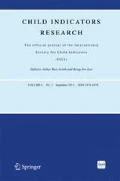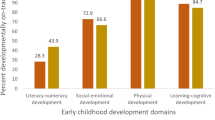Abstract
The present study investigated the associations of two childcare variables (quality of childcare and years of childcare exposure) with school readiness of 5-year-old children living in poverty. Quality of childcare practices of 27 centers in metropolitan low-income communities of South Korea was evaluated, and 189 children from absolute poverty households enrolled in the centers were tested in three areas (learning-related social skills, story comprehension abilities, and fine motor skills). This study found unique associations between quality of childcare and early academic skills of children in poverty. The quality of childcare practices at the centers where children enrolled at the age of 5 was positively associated with their learning-related social skills, story comprehension abilities, and fine motor skills. Links were not found between duration of ECEC exposure and either learning-related social skills or fine motor skills. In story comprehension, children with less than one year in ECEC showed lower abilities than did children with 1–3 years in ECEC; however, no difference in abilities was found between children with less than 1 year in ECEC and children with over 3 years in ECEC. This implies that ECEC experience from infancy is not consistently linked to higher academic skills at the age of 5.
Similar content being viewed by others
References
Barnett, W. S. (1995). Long-term effects of early childhood programs on cognitive and school outcomes. The Future of Children, 5(3), 25–50.
Blair, C. (2002). School readiness: Integrating cognition and emotion in a neurobiological conceptualization of children’s functioning at school entry. American Psychologist, 57(2), 111.
Bolger, K. E., Patterson, C. J., Thompson, W. W., & Kupersmidt, J. B. (1995). Psychosocial adjustment among children experiencing persistent and intermittent family economic hardship. Child Development, 66(4), 1107–1129.
Bronson, M. B., Goodson, B. D., Layzer, J. I., & Love, J. M. (1990). Child behavior rating scale. Cambridge: Abt Associates.
Burger, K. (2010). How does early childhood care and education affect cognitive development? An international review of the effects of early interventions for children from different social backgrounds. Early Childhood Research Quarterly, 25, 140–165.
Center on the Developing Child (2013). InBrief: Early childhood program effectiveness. Retrieved October, 30, 2013, from http://developingchild.harvard.edu/index.php/resources/briefs/inbrief_series/inbrief_program_effectiveness/.
Connell, C. M., & Prinz, R. J. (2002). The impact of childcare and parent–child interactions on school readiness and social skills development for low-income African American children. Journal of School Psychology, 40(2), 177–193.
Cooper, D. H., & Farran, D. C. (1988). Behavioral risk factors in kindergarten. Early Childhood Research Quarterly, 3, 1–19.
Crosnoe, R. (2007). Early child care and the school readiness of children from Mexican immigrant families. International Migration Review, 41(1), 152–181.
Culatta, B., Page, J. L., & Ellis, J. (1983). Story retelling as a communicative performance screening tool. Language, Speech, and Hearing Services in Schools, 14(2), 66.
De Temple, J. M., & Tabors, P. O. (1996). Children's story retelling as a predictor of early reading achievement. Paper presented at the biennial meeting of the International Society for the Study of Behavioral Development (14th, Quebec City, Quebec, Canada, August 12–16, 1996).
Duncan, G. J. (2003). Modeling the impacts of child care quality on children's preschool cognitive development. Child Development, 74(5), 1454–1475.
Duncan, G. J., Dowsett, C. J., Claessens, A., Magnuson, K., Huston, A. C., Klebanov, P., et al. (2007). School readiness and later achievement. Developmental Psychology, 43(6), 1428.
Fontaine, N. S., Torre, L. D., Grafwallner, R., & Underhill, B. (2006). Effects of quality early care on school readiness skills of children at risk. Early Child Development and Care, 176(1), 99–109.
Gresham, F. M., & Elliot, S. N. (1990). Social skills rating system. Circle Pines: American Guidance Service.
Grissmer, D., Grimm, K. J., Aiyer, S. M., Murrah, W. M., & Steele, J. S. (2010). Fine motor skills and early comprehension of the world: two new school readiness indicators. Developmental Psychology, 46(5), 1008.
Harms, T., Clifford, R. M., & Cryer, D. (1998). Early Childhood Environment Rating Scale-Revised (ECERS-R). NY: Teachers College Press.
Hooper, S. R., Burchinal, M. R., Roberts, J. E., Zeisel, S., & Neebe, E. C. (1998). Social and family risk factors for infant development at one year: an application of the cumulative risk model. Journal of Applied Developmental Psychology, 19(1), 85–96.
Howes, C., & Smith, E. W. (1995). Relations among child care quality, teacher behavior, children's play activities, emotional security, and cognitive activity in child care. Early Childhood Research Quarterly, 10(4), 381–404.
Kim Y. J (2003). A preliminary study for the application of Early Childhood Environment Rating Scale Revised Edition(ECERS-R) to Korea. Master’s thesis Yonsei University, South Korea. Retrieved October, 30, 2013, from http://library.yonsei.ac.kr/
Kim, Y. H. (2013). Measuring quality of curriculum implementation and teaching in childcare centers using accreditation standards in South Korea. Child Indicators Research, 7(2), 387–405.
Kim, S. Y., & Ahn, S. H. (2006). Relationships between learning related social skills, early school adjustment, and academic achievement of first grade children. Korean Journal of Child Studies, 27(6), 183–197.
Kim, E. S., et al. (2012). Panel Study on Korean Children 2012. Korean Institute of Korean Institute Childcare and Education. Retrieved October, 29, 2013, from http://panel.kicce.re.kr/kor/inquiry/03.jsp?mode=view&idx=6983&startPage=0&listNo=11&code=panelreport&search_item=&search_order=&order_list=10&list_scale=10&view_level=0.
Kishiyama, M. M., Boyce, W. T., Jimenez, A. M., Perry, L. M., & Knight, R. T. (2009). Socioeconomic disparities affect prefrontal function in children. Journal of Cognitive Neuroscience, 21(6), 1106–1115.
Korea Institute for Health and Social Affairs (2012). The 2012 National Survey on Fertility, Family Health & Welfare in Korea. Retrieved October, 29, 2013, from https://www.kihasa.re.kr/html/jsp/publication/research/list.jsp?division=연구보고서&page=3
Korean Institute of Special Education. (1994). KISE Developmental Scale: 6. Fine motor development subscale. Ansan: Korean Institute of Special Education.
Korenman, S., Miller, J. E., & Sjaastad, J. E. (1995). Long-term poverty and child development in the United States: results from the NLSY. Children and Youth Services Review, 17(1), 127–155.
Kwak, K. J., Kim, J. M., & Yoo, J. M. (2007). The relation of poverty, parents’ variance, home environment, and child development on 3 year old children. The Korean Journal of Developmental Psychology, 20(3), 83–98.
Lim, Y. S. (1994). The effects of a well- structured story on children’s story comprehension. Korean Journal of Early Childhood Education, 14(2), 5–20.
Loeb, S., Fuller, B., Kagan, S. L., & Carrol, B. (2004). Child care in poor communities: early learning effects of type, quality, and stability. Child Development, 75(1), 47–65.
Magnuson, K. A., Meyers, M. K., Ruhm, C. J., & Waldfogel, J. (2004). Inequality in preschool education and school readiness. American Educational Research Journal, 41(1), 115–157.
McClelland, M. M., & Morrison, F. J. (2003). The emergence of learning-related social skills in preschool children. Early Childhood Research Quarterly, 18(2), 206–224.
McClelland, M. M., Morrison, F. J., & Holmes, D. L. (2000). Children at risk for early academic problems: the role of learning-related social skills. Early Childhood Research Quarterly, 15(3), 307–329.
McClelland, M. M., Acock, A. C., & Morrison, F. J. (2006). The impact of kindergarten learning-related skills on academic trajectories at the end of elementary school. Early Childhood Research Quarterly, 21(4), 471–490.
Ministry of Health and Welfare (2012a). Statistics of child care services in South Korea. Retrieved October, 28, 2013, from http://www.bokjiro.go.kr/data/statusView.do?board_sid=297&data_sid=5761319.
Ministry of Health and Welfare (2012b). 2012 childcare accreditation guide for childcare centers (40 children and above). Retrieved January, 28, 2013, from http://www.kcpi.or.kr/.
Ministry of Health and Welfare (2013). Statistics of child care services in South Korea. Retrieved April, 1, 2014, from http://www.mw.go.kr/front_new/jb/sjb030301vw.jsp?PAR_MENU_ID=03&MENU_ID=031604&page=1&CONT_SEQ=299346.
Ministry of Health and Welfare &Ministry of Education, Technology and Science (2012). Curriculum Nuri for children aged 3–5. Retrieved October, 1, 2013, from http://www.mw.go.kr/front_new/al/sal0301vw.jsp?PAR_MENU_ID=04&MENU_ID=0403&BOARD_ID=140&BOARD_FLAG=00&CONT_SEQ=274175&page=1.
National Institute of Child Health and Human Development Early Child Care Research Network. (2003). Does amount of time spent in child care predict socioemotional adjustment during the transition to kindergarten? Child Development, 74(4), 976–1005.
OECD. (2006). Starting strong II: Early childhood education and care. France: OECD Publishing.
OECD Fact book 2013: Economic, Environmental and Social Statistics (2013). Retrieved October, 1, 2013 from http://www.oecd-ilibrary.org/economics/oecd-factbook_18147364.
Oja, L., & Jorimae, T. (2002). Physical activity, motor ability, and school readiness of 6-yr.-old children. Perceptual and Motor Skills, 95(2), 407–415.
Phillips, D. A., Voran, M., Kisker, E., Howes, C., & Whitebook, M. (1994). Child care for children in poverty: opportunity or inequity? Child Development, 65(2), 472–492.
Ramey, C. T., & Ramey, S. L. (1998). Prevention of intellectual disabilities: early interventions to improve cognitive development. Preventive Medicine, 27(2), 224–232.
Ramey, C. T., & Ramey, S. L. (2004). Early learning and school readiness: can early intervention make a difference? Merrill-Palmer Quarterly, 50(4), 471–491.
Ramey, C. T., Bryant, D. M., Sparling, J. J., & Wasik, B. H. (1985). Project CARE: a comparison of two early intervention strategies to prevent retarded Development. Topics in Early Childhood Special Education, 5(2), 12–25.
Ramey, C. T., Bryant, D. M., Wasik, B. H., Sparling, J. J., Fendt, K. H., & La Vange, L. M. (1992). Infant Health and Development Program for low birth weight, premature infants: program elements, family participation, and child intelligence. Pediatrics, 89(3), 454–465.
Raver, C. (2003). Young children’s emotional development and school readiness. Social Policy Report, 16(3), 3–19.
Roer-Strier, D. (1996). An ecological study of child care quality: a call for attention to the cultural context. European Early Childhood Education Research Journal, 4(2), 77–88.
Schweinhart, L. J. (1993). Significant Benefits: The High/Scope Perry Preschool Study through Age 27. Monographs of the High/Scope Educational Research Foundation, No. Ten. High/Scope Educational Research Foundation, 600 North River Street, Ypsilanti, MI 48198–2898.
Schweinhart, L. J. (2004). The High/Scope Perry Preschool study through age 40: Summary, conclusions, and frequently asked questions. Ypsilanti: High/Scope Press.
Sylva, K., Melhuish, E., Sammons, P., Siraj-Blatchford, I., & Taggart, B. (2004). The effective provision of pre-school education (EPPE) project: Final Report: A longitudinal study funded by the DfES 1997–2004. Institute of Education, University of London/Department for Education and Skills/Sure Start.
Taguma, M., Litjens, I., & Kim, J. H. (2012). Quality matters in early childhood education and care. Korea: OECD Publishing.
Wesley, P. W., & Buysse, V. (2003). Making meaning of school readiness in schools and communities. Early Childhood Research Quarterly, 18(3), 351–375.
Author information
Authors and Affiliations
Corresponding author
Rights and permissions
About this article
Cite this article
Lim, J.J., Ahn, S.H. & Kim, Y.H. Quality of Childcare and School Readiness of Children in Poverty: A South Korean Study. Child Ind Res 7, 881–896 (2014). https://doi.org/10.1007/s12187-014-9251-9
Accepted:
Published:
Issue Date:
DOI: https://doi.org/10.1007/s12187-014-9251-9



